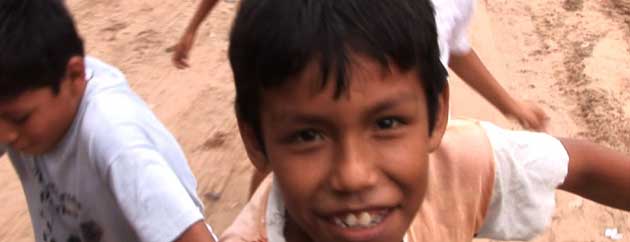
Pachamama
09 November, 2011I’m not convinced Pachamama – meaning Mother Earth – is an apt title for this film. There are certainly many glimpses of nature, and the relationship between man and nature on this road trip through Brazil, Peru and Bolivia, but it’s the sense of political unrest in the last two of these countries which really has the greatest impact.
As the film begins, a narrator – presumably director Eryk Rocha – tells us of the ambitions of the documentary. They will journey across Brazil and onto the bordering regions of Peru and Bolivia. There will be no agenda. The film will simply show the journey as it happens.
With such an agenda it would be easy for this film to have simply been a video journal of life in the most remote villages and towns of South America. What it ended up showing is the beginnings of a political revolution in Peru and Bolivia. The film was shot in 2007 when Alan García was having his second tenure as President of Peru. It is widely documented that his regime was biased to those living in Lima and the more Northern parts of Peru and this film shows how people in the other regions, such as Cuzco and the rainforest areas were reacting to the new regime, mainly by protest. More interesting though are the scenes in Bolivia.
The actual journey that the director took for this film involved just a few days in Brazil, a week in Peru and three weeks in Bolivia. Bolivia, therefore, takes up much of the film and it’s that country that I therefore want to concentrate on here for a second. Contrary to a belief that Evo Morales and MAS have brought power to the people of Bolivia, Pachamama shows many Bolivians living at odds with the government. These are Bolivians who feel that Morales is too focused on the cocaleros and the indigenous people of Bolivia – of which Morales belongs – and not to mestizos in the North who still feel strongly about their European ancestry, and therefore alienated by many of Morales’ strategies.
This manifests itself in a number of filmed protests and political rallies, which show that Rocha is quite willing to put himself in the centre of some very hostile situations. He’s also a film-maker very much adept at using the camera as an extension of himself, allowing the viewer to feel involved in each scene. This works especially well on a number of scenes showing children playing with the camera/director, therefore bringing the audience into the scene.
Where the film sometimes lets itself down is it’s rambling and uneven nature. The aim of the film was to simply document a journey, but a lot could have been done in the editing suite to ensure that there was more flow to the film and that the transitions between wide-angled shots of nature and the political scenes didn’t feel so obvious. That said, this is definitely a documentary worth a look, at least to see how these regions of South America are discovering a new poltical realm that isn’t necessarily using Western models as previous models, but taking their own traditions and culture as a guide.
Pachamama was showing as part of the Cinema of Brazil season in London during November 2011.
Follow Sounds and Colours: Facebook / Twitter / Instagram / Mixcloud / Soundcloud / Bandcamp
Subscribe to the Sounds and Colours Newsletter for regular updates, news and competitions bringing the best of Latin American culture direct to your Inbox.

